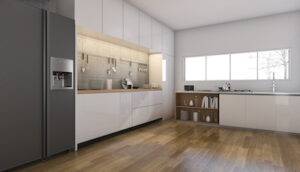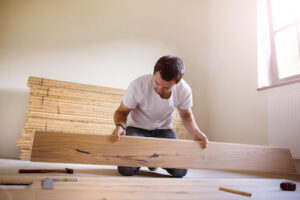What You Should Know About Squeaking Hardwood Floors
If you’ve ever been in a house with hardwood floors, you probably noticed how the floor seems like it squeaks much more than a floor with carpeting or even tile or laminate. While hardwood floors can make your house look classy and kept, many people avoid hardwood flooring because of the amount of noise the flooring seems to generate.
Is it normal for hardwood floors to squeak? Hardwood floors tend to squeak more than other types of flooring since the wooden planks create more variables that can cause noise. Here are some reasons your hardwood floors may squeak:
- Floorboards rub together
- The subflooring has been damaged or improperly installed
- Weather and Environment can cause the flooring to expand and contract
- Too much space between flooring joists
Once you diagnose why your floor is squeaking, you can then determine what you need to do to fix the problem. In most cases, you should be able to fix the squeaking yourself while in other instances you may need a professional’s help. Keep reading to learn more about your squeaking floors:
Hardwood Floors Squeaking: Floorboards Rubbing Together
What’s Happening?
One of the most common reasons your hardwood floors may be squeaking is that the floorboards are rubbing together or are rubbing against the nails holding them in place. When the two boards rub together, it creates friction which will then in turn produce a sound. This means that the flooring in this area has become loose over time.
How to Diagnose:
An easy way to tell if your floor is squeaking because something is loose is to look for movement when you walk over the affected area. Sometimes you may have to look more closely, but if this is the issue then you can usually see or feel the floorboard move up and down when you walk over it.
How to Repair:
The best way you can fix this squeak is by tightening the floorboards once more.
- Remove any loose nails or screws from the floorboard that is moving.
- Replace the nails/screws with new ones, putting the new ones back in the same place as the old ones.
- Cover the nail head with wood filler.
If you have a stud finder, you can also find the floor joists and drill nails through the wood and into the floor joists to secure the board even further.
 Hardwood Floors Squeaking: Subflooring Has Been Damaged or Improperly Installed
Hardwood Floors Squeaking: Subflooring Has Been Damaged or Improperly Installed
What’s Happening?
Subflooring is a material that goes between the underlayment of the hardwood floorboards and the floor joists in order to provide a level grade for the installation of flooring. The subfloor also helps to evenly distribute the weight and stress that the floor may experience in its lifetime. It is usually made out of plywood, pinewood, flakeboard, and particleboard.
How to Diagnose:
The issue that is causing the subflooring to squeak can be a little more difficult to diagnose since you physically can’t examine the subflooring without taking up the hardwood floor and the underlayment. Subflooring can squeak if it’s been improperly installed, damaged, or even if a harder type of wood was used for the material. In these instances, the most important thing you can do is determine whether or not the squeaking is coming from the subfloor or the floorboards.
The most recognizable indication that the subfloor is causing the squeaking is that the squeak is spread out over a larger area, meaning that you may walk a few steps and the floor will squeak every time. If the squeak were coming from just a floorboard, the floor would only make the sound when you stepped on the specific board.
How to Repair:
If the reason the subflooring is squeaking is that the subflooring has become loose from the joists, you should be able to use a stud finder to find the joists, then drill a nail down through the hardwood flooring, through the subfloor, and into the joist. However, in instances with the subfloor, you may want to contact a professional for help. They can properly remove floorboards and underlayment to examine the subflooring and see what the issue is.
 Hardwood Floors Squeaking: How Weather Affects Your Flooring
Hardwood Floors Squeaking: How Weather Affects Your Flooring
What’s Happening?
Did you know that the weather can affect your floor and cause it to squeak? During colder months, the flooring can contract and shrink; during the warmer months, the flooring can expand and grow. These movements can cause stress on the screws and the nails in the flooring and can cause floorboards to rub together. This can also affect the subflooring in the same way.
Likewise, if you live in a more humid environment, the moisture may cause the flooring to be more flexible while if you live in a dry environment, the flooring can dry up and shrink. Hardwood floors are made out of wood, and just like trees, the flooring does need a certain level of moisture to stay healthy. However, your floor doesn’t need too much moisture that it experiences water damage or mold.
If you have an in-ground pool that is attached to your home via a deck, the excess moisture brought in by wet feet may be causing the squeaking. A local swimming pool company can ensure that your pool and the surrounding areas are optimized to prevent as much moisture as possible.
How to Diagnose:
There are a few things to look for when determining whether your floor is squeaking because of the change in weather. Ask yourself these questions to determine whether or not you’re dealing with the weather:
- Has there been any significant change in weather patterns to cause this squeaking?
- Are you currently experiencing the most extreme points of winter or summer?
- Has the floor just randomly started squeaking?
- Does the squeaking sometimes go away?
If you answered “yes” to these questions, chances are that your flooring is being affected by the outdoor elements. Weather won’t usually affect the flooring so much as to damage it and require new flooring to be put down; however, it is important to understand how the temperatures and humidity can affect the structure of your home.
How to Repair:
While the floor changing due to weather may not be something you have to fix, there are things you can do to help the floor keep from squeaking. Believe it or not, but floors should be installed with the changes of weather in mind. The floor installer should leave expansion space around the perimeter of the floor; this space is usually hidden by baseboards.
You can also control the temperatures and humidity in your home from changing drastically. This will help to keep the flooring at a normal state instead of expanding or contracting with excessive temperature.
Hardwood Floors Squeaking: Too Much Space Between Flooring Joists
What’s Happening?
Do you ever feel like you have a section of your floor that feels…bouncy? Usually, these areas will squeak as well. This is caused by there not being enough support between two flooring joists. Flooring joists are the horizontal structural beams underneath the flooring, underlayment, and subfloor that provide the support your home needs to even have a floor.
If the subfloor has weakened between the joists or the joists aren’t providing enough support, the floor may feel as if it sags or bounces when you walk over it.
How to Diagnose:
This is an easy thing to diagnose; you’re mainly going to go off of how the floor feels and moves as you walk over it. When you apply your weight to the area, does it feel as if the floor is sagging or bouncing? If so, then this is probably the issue you are facing.
If there is a clear distinction of weakness between two strong points in the floor, then you have found the affected space. Be sure to mark the area so you or a professional knows exactly where to go to address the problem.
How to Repair:
You can repair this by adding a support beam between to joists or even by adding another floor joist. To do this, you may either have to go from under the flooring, like down into the basement if there is exposed joists down there, or you may have to take up the flooring, underlayment, and subflooring to do it that way.
This is not usually an easy fix and can take a lot of time if you’re by yourself and inexperienced. for these repairs, we recommend that you contact a professional to come and repair this issue.
A squeaking hardwood floor can be a nuisance and can also be a sign of repairs that need to be made. While hardwood flooring is one of the more expensive flooring options to invest in, when taken care of properly, it can last a long time and provide your home with durability.
